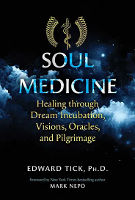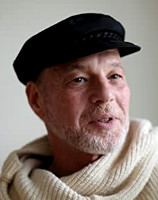
Image by Stefan Keller
Ancient testimony from worldwide indigenous sources, early Mediterranean civilizations, and both Old and New Testaments, attest that the divine communicates to humans in characteristic nonrational ways. We receive what we impute to be transpersonal messages through dreams, visions, oracles, and synchronistic events. Ancient biblical and Greek cultures, as well as modern analysts like Jung and Hillman, affirm that we can receive psycho-spiritually based and nonrational messages, images, prescriptions, or insights for healing and life guidance.
The ancients sought such nonnormative experiences in numerous ways at numerous sites as coming from numerous supra-human sources. Homer affirmed in the Odyssey that the numinous is the way a god comes. Marcus Aurelius wrote that “the gods, too, aid in all ways, by dreams, by signs, toward the attainment of their aims.” Modern depth psychology interprets that the divine has been relocated inside us as the Self and such messages arise as images and symbols from the collective unconscious of which we all partake.
Western Civilization and Science: Rational and Skeptical
Western civilization and its sciences have evolved to be rational, empirical, objective, and skeptical. These are indeed dimensions of reason but not its full scope. The ancients meant more than this by reason. Apollo was the god of truth and reason as well as the giver of oracles. Apollo was the inner light of mind, our awareness, our very ability to know. One of his epithets could be Clear Mind.
Apollo was the only god created and evolved from the Greek experience rather than imported and recreated from other earlier cultures. This uniquely Greek deity is the god of the light of mind and source of self-awareness, the power that first awakened in Greece, enthralled its inheritors, and has shaped Western civilization ever since. Reason and Apollo entered the Western human world and psyche together.
Apollo also delivered oracles. He gave the oracle that declared no one was wiser than Sokrates and so he was the philosopher’s god. Sokrates’s famous quote, “The only thing I know is that I know nothing,” is an inexact translation of the master’s untranslatable adage En oida oti oyden oida. He was saying something like this: “In knowing that we do not know.” That is, in the very act of knowing we experience both the wonder and the limitation of reason and intellect and realize that we cannot truly or fully know anything.
This limitation on human knowledge was affirmed by other philosophers. Demokritos, the originator of atomic theory, said, “We know nothing truly, for the truth lies hidden in the depth,” and “A man must learn from principle that he is far removed from the truth.” Sokrates’s disciple Plato declared that “reason is our best guide to living well . . .” Yet he recognized its limits in attaining ultimate knowledge, for he added, “The only better is divine revelation.”
Revelation may reveal what reason cannot and is received beyond its limits. We do not eliminate reason but rather employ it to scrutinize, evaluate, and integrate the revelation into the life.
Considering Myth Itself
Before looking at various forms of revelation, consider myth itself. Modern popular and scientific thought generally understand mythology to be superstition—prescientific stories that explain natural phenomena people did not yet understand. Once the sun was proven by science to be a fireball of gases millions of miles away around which the Earth rotated, it was no longer the titan’s chariot galloping daily across the ceiling of the sky with the Earth at the center of all.
We gained realistic understanding of the natural world and the ability to manipulate it. We lost magic, mystery, respect, intuitive knowing, richness of symbolism, and the felt experience that we are a small but known and connected part of the Cosmos and need to care for it.
Mythology is a unique way of knowing. It is a psychology of the Cosmos and the soul and their interrelation.
James Hillman sought to recreate psychology as a poetic enterprise heavily informed by mythology, the humanities, and humanism. Joseph Campbell demonstrated that we are all on the universal hero/heroine’s journey and mythology maps the path that is otherwise unconscious and hidden.
Mythology is itself a different way of experiencing and knowing ourselves and our connection to the All. Kerenyi calls “primordial mythology
". . . man’s representation of himself . . . and also a revelation of the world. In mythology man’s own being and the reality of the being that enfolds him are expressed simultaneously and in a modality peculiar to mythology Nothing human, no aspect of the environing world is excluded from mythology, although in other modalities the very same elements may be objects. ."
Mythology: A Unique Form of Consciousness
Hillman expresses our essential relationship to and need of myth simply and directly: “We are masks through which the Gods sound,” and “In myth Gods and humans meet.” Jungian analyst Edward Edinger explains, myths are “eternal dramas that are living themselves out repeatedly in our own personal lives and in what we see around us.
. . . They are eternal patterns of the way life happens below the surface.”
Mythology is a unique form of consciousness that includes, connects, enfolds, and energizes rather than separates, isolates, and analyzes. It provides us with images and stories that reveal our hidden dimensions and aspects of identity.
Receiving oracles or dreams in the ancient world, experiencing the pain of guilt or illnesses as divinely sent, believing earthquakes to be sent by the god of the sea to rebalance human relations with the natural order, were but a few of the forms of living mythically that once circumscribed and directed mind, heart, spirit, and culture.
Divine Communication in the Bible
Throughout the Bible, we hear direct communications and instructions from the divine, ecstatic, and trance states in which one is inspired and speaks as another or the divine instructs, synchronistic events as signs of significance, and healers with the gift of communication with the divine, and such communications coming by way of dreams, oracles, prophets, and visits from ghosts and spirits.
Many well-known passages attest to the primacy of dreams and visions in the biblical world. From Proverbs: “Where there is no vision the people perish." From the New Testament, “I will pour out of my Spirit on all flesh: and your sons and your daughters shall prophesy, and your young men shall see visions, and your old men shall dream dreams.” John received Revelations as direct communication he transcribed.
These are records of actual experiences and forms of consciousness that the ancients sought and received, valued, and used to guide their lives. Reports of dreams, visions, oracles, or omens are records of lived experiences. They are testimonies expanded over time and history into myth but recording actual nonnormative experiences and altered states of consciousness. Because they became myth does not mean that nothing “fantastic” ever happened.
Depth Psychology's Perspective on Dreams and Visions
*In my psychotherapy practice I have often been consulted by people who have had big dreams, or dreams with complex mythological or archetypal content who are stable and psychologically healthy. Misdiagnosis as psychotic is common in these instances in which the therapist has had little experience, training, or awareness of mythological and archetypal symbolism or theory.
From the perspective of depth psychology as a social science, these testimonies, dreams, vision reports, and preternatural experiences are psychic phenomena. They are “evidence” and in this sense, depth psychologists are empiricists, collecting and analyzing countless accounts of actual inner-world experiences.
Dreams and visions are, indeed, ways of transpersonal communication. Sometimes the purest of the pure, the most righteous, self-sacrificing, and obedient, may receive direct and clear communications. Others, including the prophets delivering inspired words, must receive them through nonrational channels in ambiguous form. This may indicate that nonnormative experiences vary according to their human and cultural developmental stages and contexts. It points to the difficulties and challenges of arriving at accurate interpretations of such mysterious events and ambiguous signs and messages.
Behind all this is the understanding that the visions arise from supra-personal sources and are not for individuals alone but for the welfare of all. When the people are lost, wandering, and afflicted, they need both guiding vision and some form of transpersonal connection.
Copyright ©2023. All Rights Reserved.
Adapted with permission from the publisher,
Healing Art Press, an imprint of Inner Traditions Intl.
Article Source:
Soul Medicine: Healing through Dream Incubation, Visions, Oracles, and Pilgrimage
by Edward Tick, PhD Using both ancient wisdom and modern depth psychology alongside stories of healings from his more than 25 years of guiding Vietnam veterans on Greek pilgrimages, Edward Tick explores how we all can use ancient healing philosophies and practices to achieve holistic healing today. He examines the interaction between mind and body (psyche and soma) and between physical illness and the soul to heal PTSD and trauma. He explains the art of making accurate and holistic interpretations of signs, symbols, and symptoms to determine what they reveal about the soul.
Using both ancient wisdom and modern depth psychology alongside stories of healings from his more than 25 years of guiding Vietnam veterans on Greek pilgrimages, Edward Tick explores how we all can use ancient healing philosophies and practices to achieve holistic healing today. He examines the interaction between mind and body (psyche and soma) and between physical illness and the soul to heal PTSD and trauma. He explains the art of making accurate and holistic interpretations of signs, symbols, and symptoms to determine what they reveal about the soul.
Showing how dreams and other transpersonal experiences are essential components of soul medicine, the author reveals how restoration of the soul facilitates true healing.
Click here for more info and/or to order this paperback book. Also available as a Kindle edition.
About the Author
 Edward Tick, Ph.D., is a transformational psychotherapist, international pilgrimage guide, educator, author, and poet. A specialist in archetypal psychotherapy and the healing of violent trauma, he is the author of four nonfiction books, including The Practice of Dream Healing and War and the Soul.
Edward Tick, Ph.D., is a transformational psychotherapist, international pilgrimage guide, educator, author, and poet. A specialist in archetypal psychotherapy and the healing of violent trauma, he is the author of four nonfiction books, including The Practice of Dream Healing and War and the Soul.
He is Founding Director of the non-profit Soldier’s Heart, Inc. Honored for his groundbreaking work in the spiritual, holistic and community-based healing of veterans and Post-traumatic Stress Disorder (PTSD), Dr. Tick has been a psychotherapist for over 35 years, specializing in working with veterans since the 1970s. Dr. Tick is a gifted healer, teacher and guide specializing in using psycho-spiritual, cross-cultural, and international reconciliation practices to bring healing and hope to veterans, communities and nations recovering from the traumas of war and violence.
He is a tireless advocate for war-healing and peace-making, lecturing around the world and leading semi-annual educational, healing and reconciliation journeys to Viet Nam and Greece.
Visit his Website: https://www.edwardtick.com/
More Books by the author.

























